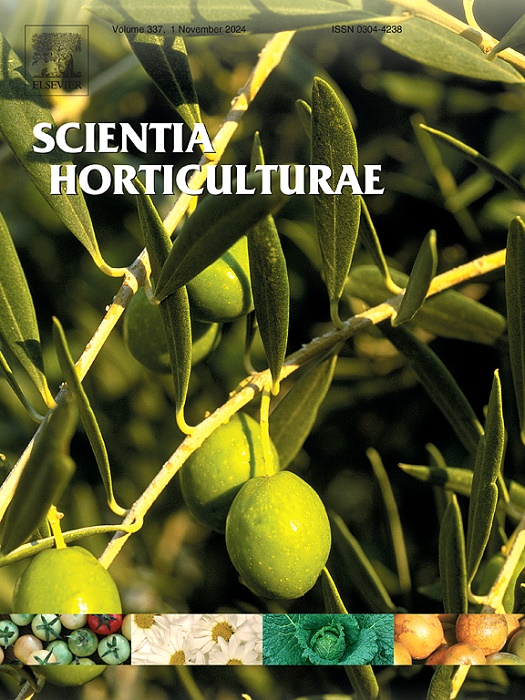Non-deep simple epicotyl morphophysiological dormancy in seeds of Helleborus thibetanus (Ranunculaceae)
IF 4.2
2区 农林科学
Q1 HORTICULTURE
引用次数: 0
Abstract
Helleborus thibetanus is a perennial herbaceous plant with high potential for medicinal and landscaping purposes. However, the dormancy characteristics of seeds and the conditions that help this species break dormancy have not been investigated. This study investigated embryo growth and the emergence of radicles and epicotyls in seeds over a range of GA3 pretreatment and temperature sequences. Upon reaching maturity, the seeds had underdeveloped embryos that developed fully at 15 °C warm stratification within 6 weeks. Immediately after embryo growth, radicles emerged during warm stratification. However, the epicotyls failed to emerge soon after the radicle emergence. Epicotyl emergence was observed in over > 13 % of seeds with an emerged radicle following 4 weeks of cold stratification at 4 °C. The effects of GA3 on radicle and epicotyl emergence were used to determine the specific types of seed dormancy. GA3 pretreatment partially substituted 15 °C warm stratification to promote radicle emergence and effectively served as a substitute for the 4 °C cold stratification to break the epicotyl dormancy. The overall temperature and GA3 requirements for breaking dormancy and seed germination indicate non-deep simple epicotyl morphophysiological dormancy in H. thibetanus.
毛茛科(Helleborus thibetanus)种子的非深单外胚轴形态生理休眠
西番莲(Helleborus thibetanus)是一种多年生草本植物,具有很高的药用和景观美化潜力。然而,该物种种子的休眠特性以及帮助其打破休眠的条件尚未得到研究。本研究调查了一系列 GA3 预处理和温度序列下种子的胚胎生长以及胚根和外胚轴的萌发情况。种子成熟时,胚发育不全,在 15 °C的温暖层积条件下,胚在 6 周内发育完全。胚生长后,胚根立即在温暖层积过程中萌发。然而,胚根萌发后不久,外胚轴却未能萌发。在 4 °C下冷藏 4 周后,超过 > 13 % 有胚根萌发的种子观察到了外胚轴萌发。GA3 对胚根和外胚轴萌发的影响被用来确定种子休眠的具体类型。GA3预处理部分替代了15 °C的温暖层积促进胚根萌发,并有效替代了4 °C的低温层积打破外胚轴休眠。打破休眠和种子萌发对温度和 GA3 的总体要求表明,H. thibetanus 的外胚轴形态生理休眠为非深层休眠。
本文章由计算机程序翻译,如有差异,请以英文原文为准。
求助全文
约1分钟内获得全文
求助全文
来源期刊

Scientia Horticulturae
农林科学-园艺
CiteScore
8.60
自引率
4.70%
发文量
796
审稿时长
47 days
期刊介绍:
Scientia Horticulturae is an international journal publishing research related to horticultural crops. Articles in the journal deal with open or protected production of vegetables, fruits, edible fungi and ornamentals under temperate, subtropical and tropical conditions. Papers in related areas (biochemistry, micropropagation, soil science, plant breeding, plant physiology, phytopathology, etc.) are considered, if they contain information of direct significance to horticulture. Papers on the technical aspects of horticulture (engineering, crop processing, storage, transport etc.) are accepted for publication only if they relate directly to the living product. In the case of plantation crops, those yielding a product that may be used fresh (e.g. tropical vegetables, citrus, bananas, and other fruits) will be considered, while those papers describing the processing of the product (e.g. rubber, tobacco, and quinine) will not. The scope of the journal includes all horticultural crops but does not include speciality crops such as, medicinal crops or forestry crops, such as bamboo. Basic molecular studies without any direct application in horticulture will not be considered for this journal.
 求助内容:
求助内容: 应助结果提醒方式:
应助结果提醒方式:


